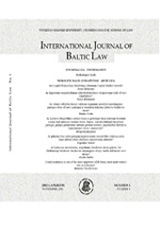Can the corporate veil be pierced under Lithuanian law?
Can the corporate veil be pierced under Lithuanian law?
Author(s): Ingrida LevickaiteSubject(s): Law, Constitution, Jurisprudence
Published by: Florida Coastal School of Law and Vytautas Magnus University School of Law
Keywords: corporate; veil; pierced; Lithuanian; law
Summary/Abstract: CAN THE CORPORATE VEIL BE PIERCED UNDER LITHUANIAN LAW? The starting point in this article is the observation that while stressing the importance of the limited liability of the legal entity as a basis for the creation and development of the market economy, the lawyers and legislators of Lithuania often forget to refer the attention to possible uses of the limited liability for the illegal purposes. This approach is without excuse when there is worldwide concern about this problem and attempts are made to handle it. Therefore, author aims at answering the question whether the laws of Lithuania allow piercing the corporate veil, which protects the shareholders of the corporation from the unlimited real liability in respect to the liabilities of the corporation. As the general basis, author states that seeking for the arguments in favour of the piercing of the corporate veil requires balancing social and economical advantages of the limited liability, while respecting the principle of the separation of managment and property in legal entity, and considering the risk that the society may take. The rule of the limited liability of the legal entity may be ignored when the principle of the separation of managment and property in legal entity is not observed, and the limited liability of the legal entity is used to pursue not the interests of the corporation, but the personal interests of the investor. Also the exceptions to this general rule are justified when the corporate veil is used to escape the legitimate claims of the creditors, when too much of the risk of the business is transfered to the creditors having no chances to protect themselves in the negotiation process. At the concrete level, author states that the mechanism (or doctrine) of the piercing of the corporate veil, although videly used in ther US, is criticized there for the indeterminacy and inconsistency of application, that the similar situation may be found in the European Union, and that this Union does not regulate this area by its legal norms, making this regulation the inherent feature of every concrete jurisdiction of the member state. The law of Lithuania provides for the possibility to pierce the corporate veil when the following conditions are satisfied: 1) corporation was unable to fulfill its obligation; 2) shareholder of corporation acted dishonestly; 3) shareholder’s dishonest acts caused corporation’s inability to fulfill its obligation. While the contents the first and third requirements is clear, the application of the second requirement may raise certain practical problems. Author makes an argument that recent Lithuanian legal base with respect to piercing the corporate veil is twofold: on the one hand, the Civil Code allows piercing the corporate veil and defines the situation when it can be done; on the other hand, the content of this statutory provision is vague and calls for elaboration by the courts. (...)
Journal: International Journal of Baltic Law
- Issue Year: 2004
- Issue No: 4
- Page Range: 25-52
- Page Count: 28
- Language: English

